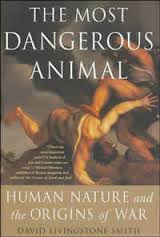This week’s book review requires a bit of explanation regarding my book selection process. I have books on my shelves that I have acquired over the course of several years, and my reading habits can become somewhat unpredictable. I pick up books for a variety of reasons. I read books based on recommendations I have received from people whose literary tastes I trust and respect. I read books based on whether they are written by a favorite author of mine, or whether they have received positive reviews or awards. I read books if I find them at a bookstore for $6 or less and they have interesting storylines. And I read books that I think will expand my knowledge base in a particular subject that I am interested in.
This week’s book I bought at Borders the week before they went out of business in my hometown (everything was on clearance, I got it for $3.25). The Most Dangerous Animal, published in 2007 is significant in light of the wars that have transpired in the last few decades. “Human Nature and the Origins of War” is the subtitle of the book written by David Livingstone Smith, the director of the Institute for Cognitive Science and Evolutionary Psychology at the University of New England.
Evolutionary Psychology has become quite a trendy field of study in the past few years. It rests on the premise that the human brain hasn’t really evolved much in the past couple thousand years, so many of the behaviors we indulge in are based on our primitive instincts for survival. Including war, as Smith argues.
The introduction is the authors attempt to provide transparency to the claims he makes. He notes that he has no first-hand experience with warfare or on the battlefield and asserts that his claims are all made with scientific data in a variety of fields – “from psychology, to philosophy, to prehistoric archeology, with forays into anthropology, phsychoanalysis, and even microbiology.” He argues that in pulling from such a variety of fields he might overstep his boundaries at times, but I felt that his arguments were generally well supported and his reasonable approach to mankinds taste for warfare was both frightening and refreshing.
Mankind is the only animal on the planet that gathers large groups of its own species in order to obliterate other large groups of its own species. Well, we are almost the only animal on the planet that displays this behavior. It turns out chimpanzees also display behaviors of warfare between groups. Smith gets into the biological origins of how warfare became a practiced behavior among humans, arguing that it benefited male humans to be violent in order to gain mating potential among females.
What makes Smith’s book worth reading is the insight into the psychological aspects of warfare – the excruciating lengths we go to in order to justify our own violence. Smith describes the phrases and images we use in order to sanitize warfare and make it seem necessary in order to preserve or gain physical (or nonphysical) resources. The ways that warfare and the physical act of killing negatively affect soldiers, and the lengths that soldiers go to in order to avoid killing their fellow human beings.
The book does not shy away from describing war as “simultaneously hideous and exciting.” The author describes our instinct to violently obliterate an enemy and our innate aversion to killing our fellow human beings as being neck-at-neck, leaving the audience to ask the question: are humans more than highly evolved animals? That is an answer he leaves us to determine for ourselves.
Overall score: 6 – highly recommended for those interested in the study of human nature, especially the uglier aspects.
(Scores are given on a scale of 1 to 10. 1 being “don’t waste your time reading this” and 10 being “you must read this at some point in your life.”)
Helpful Reviews:
http://blogcritics.org/book-review-the-most-dangerous-animal/
http://www.spring.org.uk/2007/10/why-war-most-dangerous-animal-by-david.php

